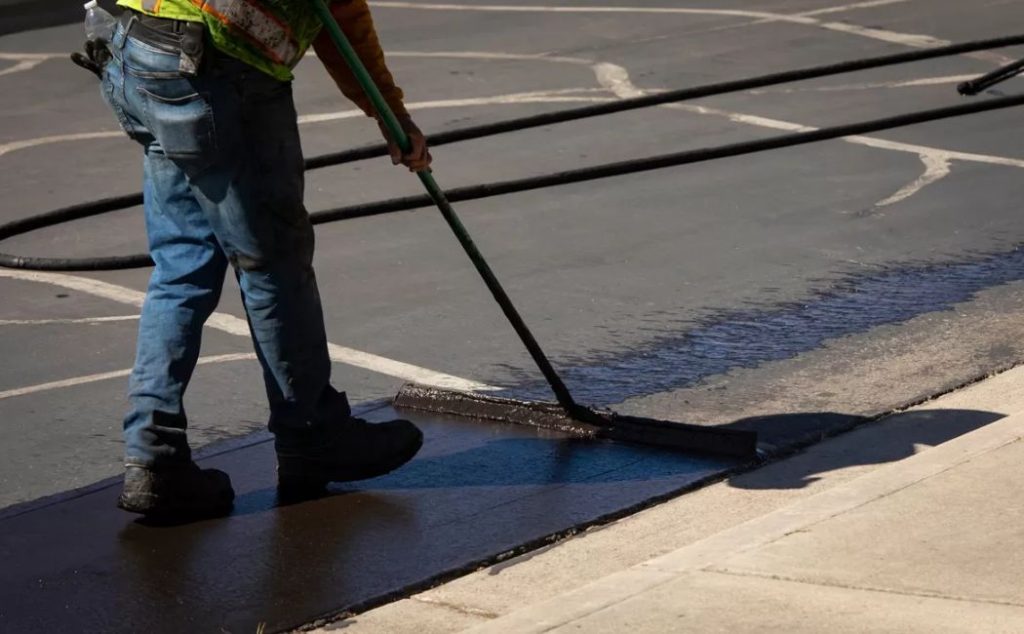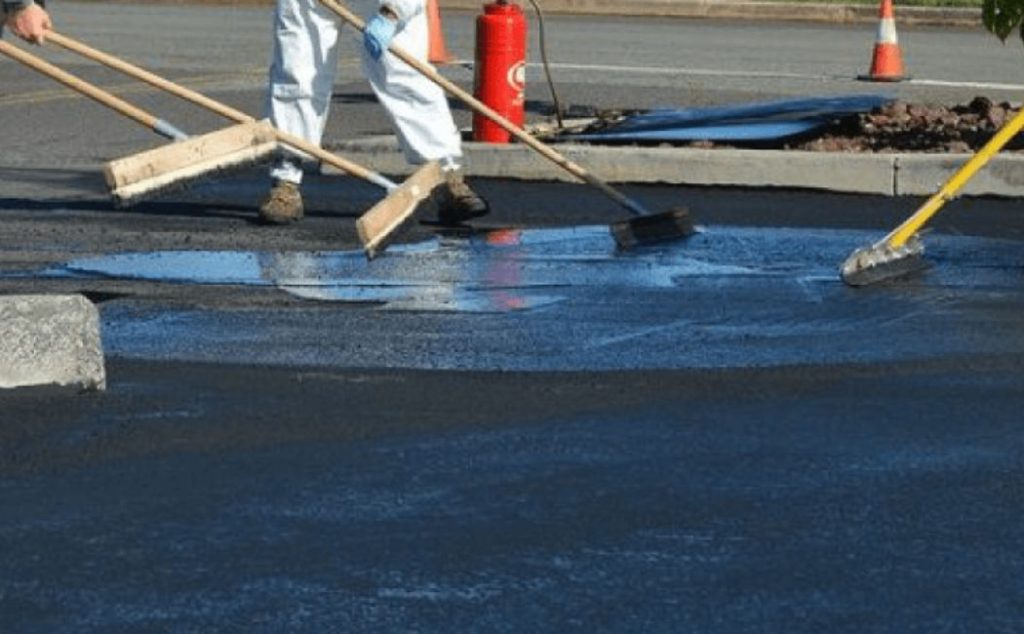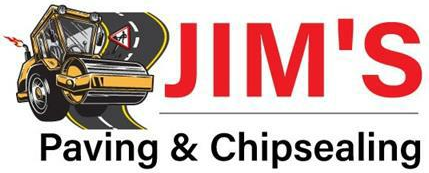A driveway is not just a place where you park your car; it is one of the places that visitors notice about your home. With time, exposure to sunlight, snow, chemicals, and vehicle traffic can take a toll on your driveway, leading to cracks, fading, and costly repairs. One of the effective ways of protecting your driveways and extending their lifespan is through seal coating.
Seal coating is a maintenance process that is applied as a protective layer over asphalt or chip-and-seal driveways. This barrier shields your driveway from damage, enhances its appearance, and saves money in the long run. Whether you’re considering driveway sealcoating, asphalt sealcoating, or looking into the best driveway sealer, understanding how seal coating works will help you make an informed decision.
In this blog, we will explore why seal coating is essential, the different types of sealers and coatings available, and why hiring professionals for the job often delivers the best results.
What Is Seal Coating?
Seal coating is the process of applying a protective coating—such as liquid asphalt, coal tar, or polymer-based sealants—over your driveway’s surface. The coating works like sunscreen for your asphalt, protecting it from oxidation, UV rays, and water penetration.
When water seeps into unprotected asphalt, it weakens the surface and causes cracks. Over time, these cracks expand, creating potholes and structural damage. By applying driveway seal coating, you add a barrier that prevents damage before it starts.
Benefits Of Seal Coating Your Driveway
Protection Against Weather Damage
Asphalt is particularly vulnerable to the freeze-thaw cycle. Water enters cracks, freezes in winter, and expands, causing the cracks to widen. Asphalt sealcoating prevents water penetration and reduces the risk of cracks and potholes forming.
Protects against Oxidation And UV Damage
Over time, the sun’s rays break down the asphalt, turning it brittle and gray. Seal coating asphalt protects the surface from oxidation, keeping your driveway flexible and resistant to cracking.
Enhances The Aesthetic Appeal
Newly done asphalt gives your driveways a rich, black finish that looks brand new. A well-maintained driveway not only enhances the appearance of your home but also increases its property value.
Cost-Effective Maintenance
Without seal coating, you’ll eventually face expensive repairs or even complete replacement. Applying the best driveway sealer every few years is a small investment compared to the high cost of resurfacing or replacing an entire driveway.
Resists Chemical Spills
Oil, gasoline, and de-icing salts can break down asphalt quickly. Seal coating creates a barrier that makes it easier to clean spills before they cause permanent damage.

Driveway Sealcoating Vs Asphalt Sealcoating
Many homeowners are confused between driveway sealcoating and asphalt sealcoating. These terms are used interchangeably, but here is a quick breakdown:
- Driveway Sealcoating: Refers specifically to sealing residential driveways, whether made from asphalt, chip-and-seal, or other variations.
- Asphalt Sealcoating: Refers to sealing any asphalt surface, including commercial parking lots, roadways, and driveways.
Both processes use similar techniques, but residential driveway seal coating is usually done on a smaller scale with products designed for residential traffic loads.
Different Types Of Driveway Sealers
Choosing the right sealer is key to achieving long-lasting protection. Here are the most common options:
1. Coal Tar Sealer
- Durable and resistant to chemicals.
- Provides a rich black finish.
- It may not be eco-friendly compared to other options.
2. Asphalt Emulsion Sealer
- More environmentally friendly.
- Good for UV and weather protection.
- Easier to apply, but may not last as long as coal tar.
3. Acrylic Sealer
- Offers strong protection against UV rays.
- Often more expensive but longer lasting.
- Ideal if you’re seeking premium driveway protection.
4. Chip and Seal Driveway Sealer
A chip and seal driveway uses layers of liquid asphalt and small stone chips. Applying a high-quality chip seal not only strengthens the surface but also provides a textured finish that enhances traction. For homeowners seeking durability with a rustic look, professional chip seal is an excellent option.
The Seal Coating Process
Here’s what typically happens during a seal coating asphalt project:
- Surface Cleaning
The driveway is cleared of debris, dirt, and oil stains to ensure proper adhesion.
- Crack Repair
Any visible cracks are filled with hot rubberized sealant.
- Application of Sealer
A uniform coat of sealer is applied using a spray or squeegee system.
- Curing
The surface is left to cure for 24–48 hours before vehicles can use the driveway.
For the best results, seal coating should be done during warm, dry weather to allow proper curing.

How Often Should You Seal Coat Your Driveway?
Most experts recommend applying driveway seal coating every 2–3 years, depending on climate and driveway usage. If your driveway shows signs of fading, cracking, or rough texture, it’s likely time for resealing.
In areas with harsh winters or heavy rainfall, you may need to apply seal coating more frequently.
Tips for Getting the Best Results
- Choose the Right Time of Year
Spring and summer are ideal, with temperatures above 50°F and no rain.
- Prepare the Driveway Properly
Clean thoroughly and repair cracks before applying sealer.
- Use High-Quality Products
Whether you’re applying yourself or hiring professionals, opt for a high-quality chip seal or premium asphalt sealer.
- Don’t Over-Apply
One or two thin coats are better than a single thick layer, which can peel.
Final Thoughts
Your driveway is an investment worth protecting. Regular seal coating of asphalt is the best way to extend its lifespan, maintain its appearance, and avoid costly repairs.
At Jim Paving & Chip Sealing, we have professional asphalt driveway sealer for a traditional blacktop or a professional chip seal for a textured finish.
Applying the right product at the right time makes all the difference. By getting our driveway sealcoating services, you can enjoy a smooth, durable, and attractive driveway for many years.
Frequently Asked Questions
How often should I seal coat my driveway?
Most driveways should be seal-coated every 2–3 years. In areas with harsh winters or heavy traffic, resealing may be needed more frequently.
Can seal coating repair cracks and potholes?
Seal coating is preventive, not a repair method. Small cracks can be filled before seal coating, but deep cracks or potholes require patching first.
What is the best driveway sealer to use?
The best driveway sealer depends on your needs. Coal tar sealers are very durable, asphalt emulsions are eco-friendly, and acrylic sealers provide long-lasting UV resistance.
Is DIY driveway sealcoating effective?
DIY seal coating can provide short-term protection, but professional seal coating uses commercial-grade products and ensures even application for longer-lasting results.
Do chip and seal driveways need sealing, too?
Yes. A chip and seal driveway benefits from a high-quality chip seal application, which strengthens the bond between asphalt and stone while protecting against weather and erosion.

